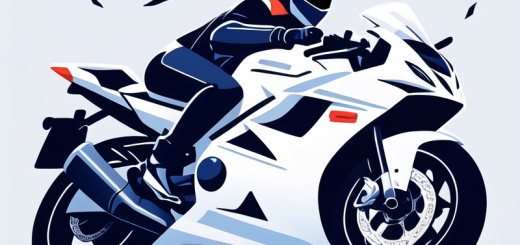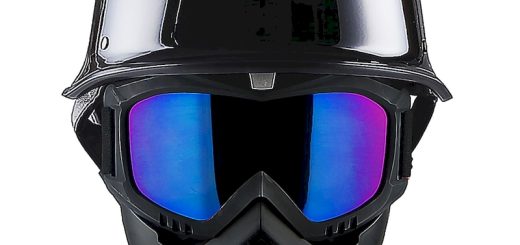Guide to Motorcycle Air Filters: Performance and Maintenance
Introduction: Understanding the Importance of Motorcycle Air Filters
Motorcycle air filters play a crucial role in maintaining engine performance and longevity. These components are essential for ensuring that your motorcycle’s engine receives a clean supply of air, free from dirt, dust, and other contaminants. This clean airflow is vital for the combustion process, impacting everything from horsepower to fuel efficiency. Over time, air filters can become clogged or dirty, leading to decreased performance and potential engine damage.
Most motorcycle owners often overlook the importance of air filters in their regular maintenance routines. However, understanding the function and significance of motorcycle air filters can significantly enhance your riding experience. When air filters are in good condition, they help ensure optimal engine operation, improved fuel economy, and better throttle response. In this extensive guide, we will explore the different types of motorcycle air filters, their maintenance requirements, signs of wear, and the advantages of upgrading to a high-performance air filter. By the end of this article, you will have the knowledge needed to keep your motorcycle running smoothly and efficiently.
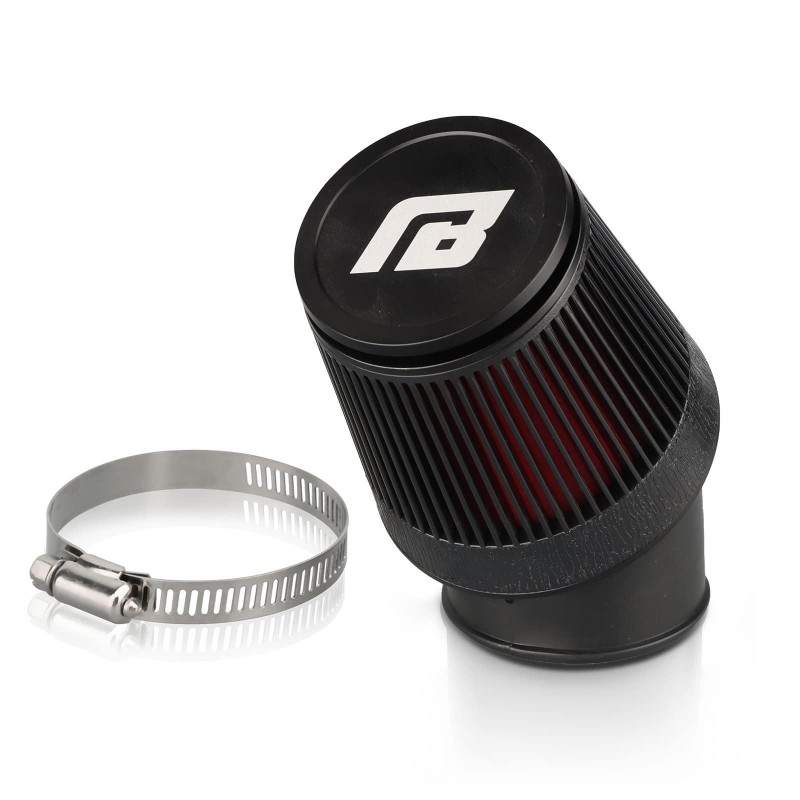
Types of Motorcycle Air Filters
Motorcycle air filters come in various designs and materials, each serving a specific purpose and offering distinct advantages. Understanding the different types of air filters available can help you choose the best one for your motorcycle.
Foam Air Filters
Foam air filters consist of an open-cell foam material that captures dirt and debris. These filters are popular in off-road motorcycles, as they provide excellent filtration while allowing substantial airflow.
- Pros: Foam filters are washable and reusable, making them a cost-effective choice. Additionally, they excel in harsh environments, where dirt and dust are prevalent.
- Cons: Foam filters require regular cleaning and re-oiling to maintain their effectiveness. If not properly maintained, they can allow contaminants to bypass the filtration.
Paper Air Filters
Paper air filters are mass-produced and commonly found in many motorcycles. They utilize pleated paper that traps dirt particles as air flows through the filter.
- Pros: These filters are generally very effective at capturing particles, providing good filtration for daily riding conditions. They’re also easy to replace and relatively inexpensive.
- Cons: Paper filters are not washable, so once they become dirty, they must be replaced. They can also restrict airflow when dirty, which may lead to reduced engine performance.
Cotton Gauze Filters
Cotton gauze air filters make use of multiple layers of cotton fibers, which are designed to trap dirt while allowing for increased airflow. These filters often come with a metal frame and are usually washable and reusable.
- Pros: Cotton gauze filters offer excellent filtration while maximizing airflow to the engine. Their reusable nature makes them an eco-friendly option.
- Cons: Like foam filters, cotton gauze filters require cleaning and re-oiling. Improper maintenance can diminish their filtering capabilities.
High-Performance Air Filters
High-performance air filters are designed to enhance engine performance for sport and racing motorcycles. They typically employ advanced materials and technology to improve airflow and filtration.
- Pros: These filters can result in increased horsepower and throttle response. They often outperform standard filters and may improve fuel efficiency.
- Cons: High-performance air filters can be more expensive upfront, and some may not provide adequate filtration for everyday riding in harsh environments.
The Role of Motorcycle Air Filters in Engine Performance
Motorcycle air filters have a direct impact on engine performance. Understanding how they function can help you appreciate their importance in maintaining your motorcycle.
Maximizing Airflow
Engines require a specific air-to-fuel ratio for optimal combustion. Motorcycle air filters control the amount of air entering the engine, affecting performance in various ways. A clean filter allows for better airflow, enabling the engine to breathe more efficiently. Conversely, a clogged or dirty filter restricts airflow, leading to lower power output and decreased throttle response.
Filtration Efficiency
The primary function of motorcycle air filters is to prevent contaminants from entering the engine. Dirt, dust, and other particles can cause significant damage to engine components over time. A high-quality air filter effectively captures debris while allowing for maximum airflow. Regular maintenance helps ensure that the filter continues to perform efficiently, protecting the engine from potential harm.
Impact on Fuel Efficiency
Efficient air intake supports optimal combustion within the engine. A clean air filter enables the engine to fire efficiently, which can lead to improved fuel economy. When the filter is dirty, the engine may require more fuel to compensate for the reduced airflow, resulting in decreased mileage.
Engine Longevity
Maintaining a clean air filter can significantly prolong the life of your motorcycle engine. Contaminated air filters expose the engine to harmful particles that can lead to wear and tear. By ensuring that your air filter is in good condition, you can prevent many common engine problems associated with poor air quality.
Signs of a Failing Motorcycle Air Filter
Recognizing the signs of a failing motorcycle air filter is essential for timely maintenance. Ignoring these symptoms can lead to diminished engine performance and even serious damage. Here are some common indicators that your air filter may need attention:
Reduced Engine Performance
One of the first signs of a clogged air filter is a noticeable decrease in engine performance. You may experience sluggish acceleration, reduced power, or difficulty maintaining speed. If your motorcycle struggles to respond when you twist the throttle, consider checking the air filter.
Increased Fuel Consumption
A dirty air filter forces the engine to work harder and consume more fuel to maintain performance. If you notice a decline in fuel efficiency, a clogged air filter may be the culprit. Regularly monitoring your mileage can help you identify unusual changes in consumption.
Unusual Engine Noises
Strange noises coming from the engine, such as wheezing or sputtering sounds, could signal airflow issues. A failing air filter restricts intake air, leading to improper combustion and abnormal engine behavior.
Check Engine Light
In some modern motorcycles, a malfunctioning air filter can trigger the check engine light. If this warning appears on your dashboard, it’s worth investigating the air filter as a potential cause.
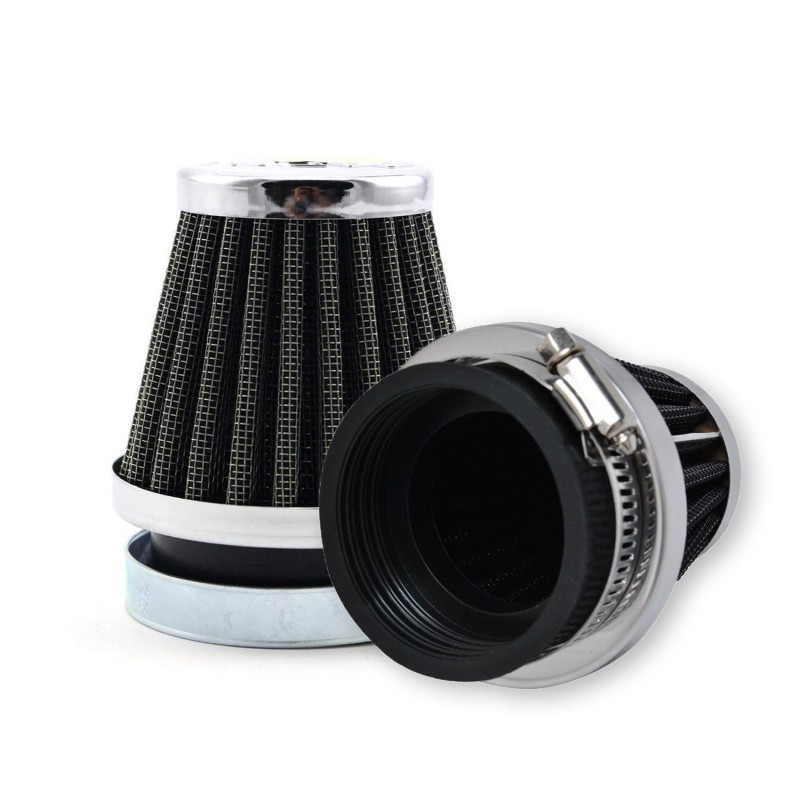
Visual Inspection
You can perform a visual inspection of the air filter during routine maintenance checks. If it appears dirty or clogged with debris, it may be time for a cleaning or replacement. Checking the filter regularly can help you maintain optimal performance.
Maintenance Tips for Motorcycle Air Filters
Proper maintenance of motorcycle air filters is essential for ensuring efficiency and extending the life of your engine. Here are essential tips for maintaining your air filters:
Regular Inspections
Incorporate air filter inspections into your routine maintenance schedule. Check the filter’s cleanliness every 5,000 to 10,000 miles, or follow your motorcycle manufacturer’s recommendations.
Cleaning Procedures
For reusable air filters, such as foam and cotton gauze types, you should clean them regularly. Follow these steps:
- Remove the Filter: Start by taking the air filter out of the intake system.
- Clean the Filter: Use compressed air or a gentle spray of water to remove dirt and debris. For heavy buildup, soak the filter in a safe cleaning solution, then rinse thoroughly.
- Dry Completely: Allow the filter to dry completely before reintroducing it into the engine. Moisture can negatively affect performance.
- Re-oil if Necessary: If using a gauze filter, apply the appropriate air filter oil to ensure optimal performance and filtration.
Replacement Guidelines
Determine the proper interval for replacing your air filter based on your motorcycle model and usage. Common indicators for replacement include:
- Mileage: Check the manufacturer’s recommendations regarding the replacement schedule.
- Physical Condition: If you can’t clean the air filter effectively or it shows excessive wear or physical damage, replace it.
Environmental Considerations
If you often ride in dusty or dirty conditions, consider inspecting the air filter more frequently. Dusty environments can lead to rapid buildup on the filter surface. Similarly, riding in rain can cause water accumulation in the filter, affecting performance.
Use Quality Parts
When replacing motorcycle air filters, always choose high-quality parts that meet or exceed OEM standards. Quality filters ensure better airflow and filtration, ultimately enhancing engine performance.
Upgrading Your Motorcycle Air Filters: Pros and Cons
If you’re considering an upgrade for your motorcycle air filter, there are several factors to weigh. High-performance air filters can enhance engine output but may not be necessary for all riders. Here are the pros and cons of upgrading your air filter:
Pros of Upgrading
- Improved Performance: High-performance air filters can boost horsepower and throttle response, providing a more exhilarating riding experience.
- Enhanced Filtration: Most premium air filters offer superior filtration capabilities, ensuring cleaner air enters the engine, which can prolong its lifespan.
- Long-lasting Options: Many upgraded filters are reusable, meaning they can save you money over time. While the initial investment might be higher, the ability to clean and maintain them can lead to lower long-term costs.
Cons of Upgrading
- Cost: High-performance air filters can be pricier than standard paper filters. This initial investment may prompt some riders to hesitate.
- Installation Requirements: Some upgrades may require a more complex installation or adjustment of the air intake system, necessitating professional assistance for some riders.
- Potential Overkill for Daily Riders: If you primarily use your motorcycle for commuting or casual riding, you may not experience the full benefits of an upgraded filter. In such cases, a standard filter may suffice.
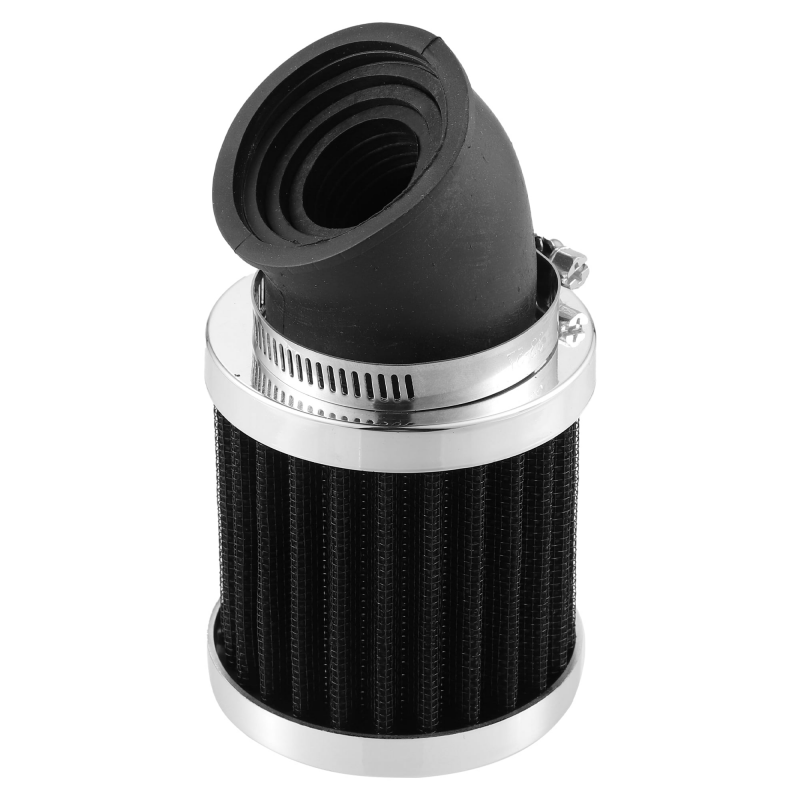
Conclusion: Ensuring Optimal Performance with Quality Motorcycle Air Filters
In conclusion, motorcycle air filters play an essential role in ensuring the performance and longevity of your motorcycle engine. Understanding the various types of motorcycle air filters, recognizing signs of wear, and practicing proper maintenance can significantly enhance your riding experience.
By regularly inspecting and maintaining your air filters, you can improve engine performance and keep your motorcycle running smoothly. Investing in high-quality air filters may provide additional benefits, including better filtration and performance enhancement, particularly for sport and performance riders.
Ultimately, ensuring that your motorcycle has the right air filter will contribute to a safer, more enjoyable ride. Whether you choose to stick with standard filters or opt for high-performance upgrades, prioritize the maintenance and care of your motorcycle air filters to keep your engine operating at its best.
